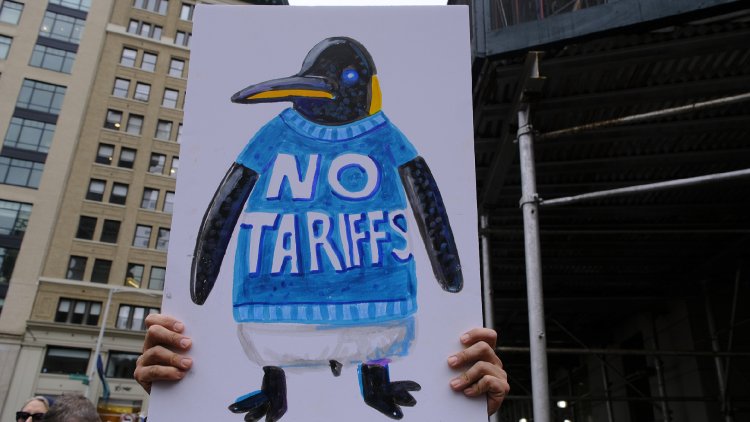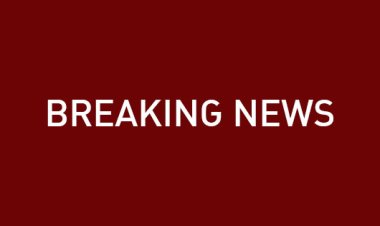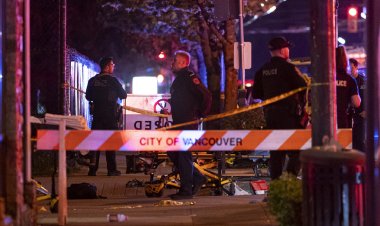Large-Scale Demonstrations Against Trump Administration Break Out in U.S. and Europe
On Saturday, hundreds of thousands of demonstrators convened in numerous cities throughout the United States and Europe to express their discontent with the contentious policies of U.S. President Donald Trump's administration. These policies include the implementation of "reciprocal tariffs," the closure of federal agencies, and the deportation of immigrants.

In the U.S., approximately 600,000 individuals participated in over 1,400 protests that spanned all 50 states, organized under the banner of "Hands Off." This movement was coordinated by a coalition of more than 150 groups, including civil rights organizations, labor unions, and veterans' associations. Protesters convened at various locations such as state capitols, federal buildings, congressional offices, Social Security Administration headquarters, city halls, and public parks.
"This peaceful movement is powered by everyday people – nurses, teachers, students, parents – who are rising up to protect what matters most. We are united, we are relentless, and we are just getting started," remarked Rahna Epting, executive director of the activist group MoveOn.
"We're here fighting for the soul of America," stated Angela C., a protester in Los Angeles, in an interview with Xinhua. "Do we remain the guiding light for progress, compassion, and fairness in the world as founding fathers dreamt of? Or follow Trump to become another pathetic bully with a big stick out to exploit all the other countries in the world?"
Elected officials also participated in the protests. Boston Mayor Michelle Wu expressed her desire for her children and others to grow up in a world where threats and intimidation are not government tactics, and where values like diversity and peace are upheld.
In response to the demonstrations, the White House asserted that "President Trump will not be deterred from delivering on the promises he made to make our federal government more efficient and more accountable to the hardworking American taxpayers across the country who overwhelmingly re-elected him," according to USA Today.
Similar protests took place in European cities, including Berlin, Frankfurt, Paris, London, and Lisbon. In Berlin, demonstrators gathered outside a Tesla showroom to protest against its owner, Elon Musk, who is seen as a close ally of Trump. Meanwhile, in London, protesters assembled at Trafalgar Square, brandishing signs that read "Proud American Ashamed" and chanting phrases like "Hands off Canada" and "Hands off Greenland."
These marches in Europe followed closely after Trump announced a 20 percent "reciprocal" tariff on EU imports. U.S. Secretary of State Marco Rubio also attended his first NATO foreign ministers' meeting in Brussels earlier in the week, which was widely interpreted as an attempt to manage transatlantic tensions ahead of the upcoming NATO leaders' summit in June.
Backlash erupted globally in response to the tariffs.
European Commission President Ursula von der Leyen expressed her dismay about the U.S. tariffs, labeling them "a major blow to the world economy" and warning of severe repercussions. "The global economy will massively suffer," she stated. "Uncertainty will spiral and trigger the rise of further protectionism. The consequences will be dire for millions of people around the globe."
On social media platform X, Czech Minister of Industry and Trade Lukas Vlcek criticized the new tariffs as a "mistake." Additionally, Manfred Weber, the leader of the European People's Party and a member of the European Parliament, characterized April 2—the day of Trump's tariff announcement, dubbed by him as "liberation day" for the United States—as "resentment day."
"Donald Trump's tariffs don't defend fair trade. They attack it out of fear and hurt both sides of the Atlantic," he stated.
British Business and Trade Secretary Jonathan Reynolds conveyed his disappointment regarding the tariffs imposed on the UK, emphasizing that the 10-percent tariff does not accurately reflect current trade dynamics.
In Asia, Japan's Chief Cabinet Secretary Yoshimasa Hayashi raised "serious concern" over the U.S. decision to impose reciprocal tariffs, warning that they could significantly harm the global economy and multilateral trade system.
South Korean Prime Minister Han Duck-soo, acting as president following the impeachment of President Yoon Suk-yeol, exclaimed during an emergency economic security meeting in Seoul, "As the global tariff war is coming to a reality, the government should pour out all of its capabilities to overcome a trade crisis."
Meanwhile, Chinese officials condemned the tariffs as "a tool of extreme pressure for selfish gain." They argued that under the guise of seeking "reciprocity" and "fairness," the United States is engaging in zero-sum tactics, ultimately aiming for "America First" and "American exceptionalism," as stated in an official announcement from the Chinese government.
Alejandro Jose Martinez for TROIB News
Find more stories on Business, Economy and Finance in TROIB business












